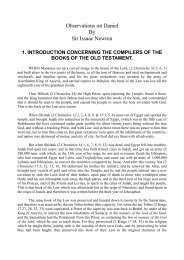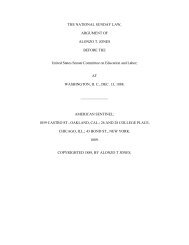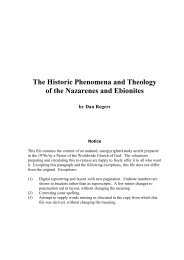Legends of the Shawangunk2 JR.pdf - Friends of the Sabbath ...
Legends of the Shawangunk2 JR.pdf - Friends of the Sabbath ...
Legends of the Shawangunk2 JR.pdf - Friends of the Sabbath ...
Create successful ePaper yourself
Turn your PDF publications into a flip-book with our unique Google optimized e-Paper software.
70 <strong>Legends</strong> <strong>of</strong> <strong>the</strong> Shawangunk.<br />
THE DUBOIS HOMESTEAD.<br />
AN early settler and patentee <strong>of</strong> Orange county, and one who figured quite largely<br />
in events pertaining to <strong>the</strong> frontier history <strong>of</strong> what is now Montgomery township, was<br />
Henry Wileman, an Irishman by birth, and a man <strong>of</strong> many sterling qualities. He was <strong>the</strong><br />
proprietor <strong>of</strong> a tract <strong>of</strong> 3000 acres granted him in 1709; <strong>the</strong> estate was located on <strong>the</strong> east<br />
bank <strong>of</strong> <strong>the</strong> Walkill, below <strong>the</strong> village <strong>of</strong> Walden. His name appears on <strong>the</strong> records as a<br />
member <strong>of</strong> St. Andrew’s church, as early as 1733. A church edifice constructed <strong>of</strong> logs,<br />
that had been built on his land for <strong>the</strong> use <strong>of</strong> <strong>the</strong> society, was standing in 1775.<br />
Wileman was a free-liver, noble, and generous to a fault. He built his log palace on<br />
<strong>the</strong> site where afterward stood <strong>the</strong> DuBois homestead, <strong>of</strong> Revolutionary fame. It was a<br />
beautiful location; <strong>the</strong> soil was fine, and <strong>the</strong> patentee <strong>of</strong> 3000 acres entertained right<br />
royally. His convivial propensities frequently carried him to excess, and, if tradition is<br />
to be credited, <strong>the</strong> revelries in <strong>the</strong> Wileman log house were notorious through <strong>the</strong><br />
country round.<br />
In process <strong>of</strong> time Henry Wileman died, and it was meet that he should be buried as<br />
became a patentee <strong>of</strong> 3000 acres. It does not appear that he ever married; or that any<br />
relative had ever followed him to this distant clime. But <strong>the</strong> rich, when <strong>the</strong>y die, never<br />
lack for mourners, or at least those who outwardly affect great sorrow for <strong>the</strong>ir death.<br />
So it came to pass that <strong>the</strong> friends <strong>of</strong> Wileman arranged to have <strong>the</strong> burial take place<br />
with all <strong>the</strong> pomp and splendor and outward tokens <strong>of</strong> regard for his memory that should<br />
characterize <strong>the</strong> funeral solemnities <strong>of</strong> a great man, according to <strong>the</strong> notions and customs<br />
<strong>of</strong> those early times.<br />
It was <strong>the</strong>n <strong>the</strong> prevailing usage to furnish liquor on all such occasions. No funeral<br />
was complete without it. They would sooner think <strong>of</strong> doing without <strong>the</strong> sermon than<br />
without <strong>the</strong> rum. As Wileman died possessed <strong>of</strong> his thousands <strong>of</strong> acres, it would be a<br />
lasting disgrace to limit <strong>the</strong> supply <strong>of</strong> liquor when celebrating his obsequies. The cellar<br />
was stored with <strong>the</strong> choicest wines; what could be more appropriate, or what could better<br />
voice <strong>the</strong> public sorrow, than that <strong>the</strong>se wines should be drawn forth and made to do<br />
duty in assisting in <strong>the</strong> giving <strong>of</strong> suitable honors to <strong>the</strong> memory <strong>of</strong> <strong>the</strong>ir late owner!<br />
In short, <strong>the</strong> people, young and old, were urged to drink. If any were backward,<br />
<strong>the</strong>y were chided for <strong>the</strong>ir lack <strong>of</strong> respect for <strong>the</strong> memory <strong>of</strong> <strong>the</strong> departed, whose<br />
obsequies <strong>the</strong>y were <strong>the</strong>n observing; and <strong>the</strong> wine was handed round when <strong>the</strong>y could<br />
not well help <strong>the</strong>mselves.<br />
At length <strong>the</strong> hour came in which <strong>the</strong> funeral cortege was to move from <strong>the</strong> late<br />
residence <strong>of</strong> <strong>the</strong> deceased to his place <strong>of</strong> sepulchre. This was before <strong>the</strong> day <strong>of</strong> black<br />
caparisoned steeds and heavily draped catafalques. The procession was more primitive<br />
in its make-up. All being ready, <strong>the</strong> bearers <strong>of</strong> <strong>the</strong>
















